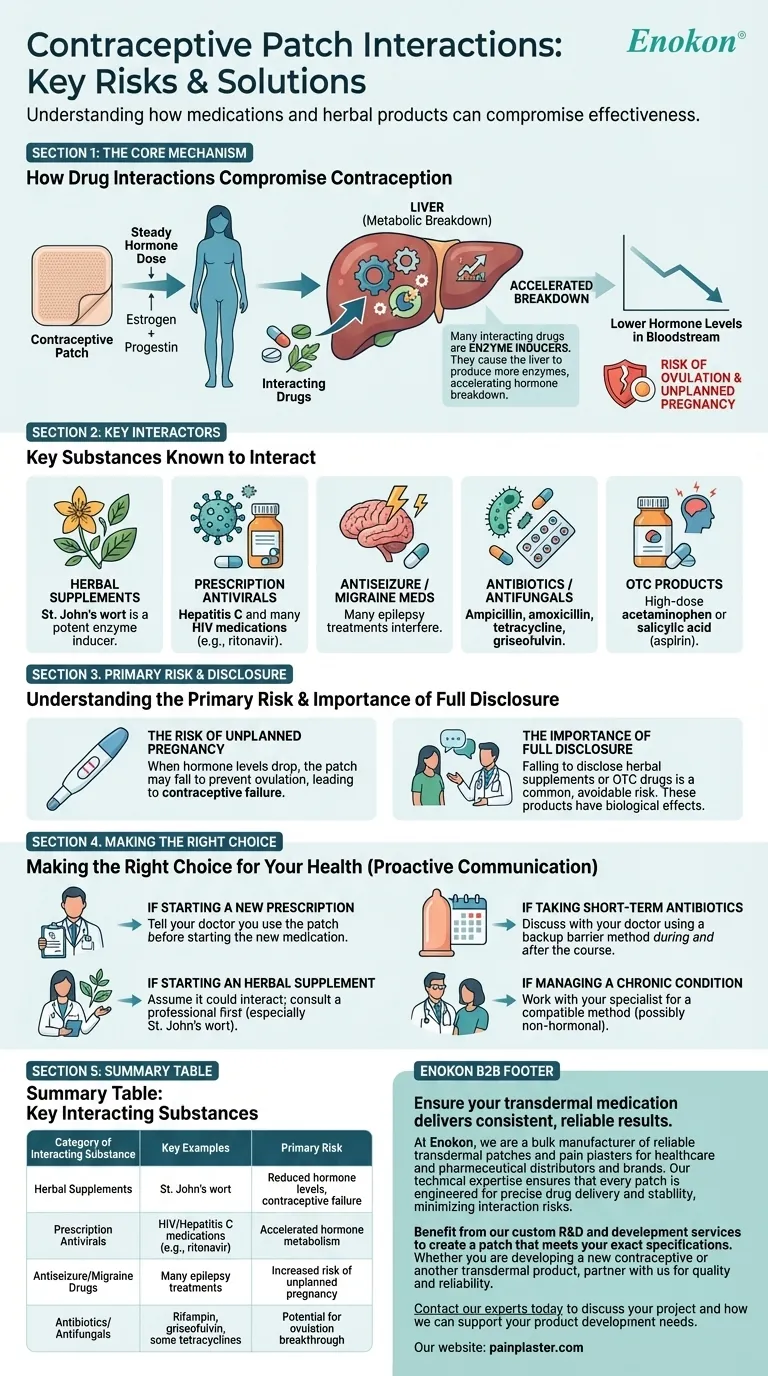A number of common medications and herbal products can interact with the contraceptive patch, potentially reducing its effectiveness. These include the herbal supplement St. John's wort, certain antiseizure drugs, specific antiviral medications used for HIV or Hepatitis C, and some antibiotics and antifungals.
The central issue is that certain substances can accelerate how your body metabolizes the hormones in the patch. This lowers the hormone levels in your bloodstream, making the patch less effective at preventing pregnancy.

How Drug Interactions Compromise Contraception
The contraceptive patch works by releasing a steady dose of estrogen and progestin into your body. The effectiveness of this process depends on maintaining stable hormone levels.
The Core Mechanism: Metabolic Breakdown
Many interacting drugs are known as enzyme inducers. They cause your liver to produce more of the enzymes that break down hormones.
When this happens, the estrogen and progestin from the patch are cleared from your body faster than intended. This drop in hormone levels can be significant enough to allow ovulation to occur, creating a risk of unplanned pregnancy.
Key Substances Known to Interact
It is critical to be aware of specific categories of medications and supplements that can interfere with your hormonal birth control. This list is not exhaustive, and you must always consult a healthcare professional.
Herbal Supplements: A Common Pitfall
The most well-documented herbal interactor is St. John's wort. It is a potent enzyme inducer and has been clearly shown to decrease the effectiveness of hormonal contraceptives.
Prescription Antiviral Medications
Certain powerful antiviral drugs can have significant interactions. This includes medications for Hepatitis C (such as ombitasvir, paritaprevir, and ritonavir) as well as many HIV medications.
Antiseizure and Migraine Medications
Many drugs used to control seizures are known to interfere with hormonal birth control. If you take medication for epilepsy or certain types of migraines, it is essential to discuss your contraceptive options with your doctor.
Antibiotics and Antifungals
Some, but not all, antibiotics and antifungals may reduce the patch's effectiveness. Specific examples cited in studies include ampicillin, amoxicillin, tetracycline, and griseofulvin. While the risk with many common antibiotics is considered low, it is still a point of caution.
Common Over-the-Counter Products
Even nonprescription products can potentially interact. Regular, high-dose use of medications containing acetaminophen or salicylic acid (a component of aspirin) may have an effect and should be discussed with your provider.
Understanding the Primary Risk
Failing to account for these interactions has one primary consequence that outweighs all others.
The Risk of Unplanned Pregnancy
The single most significant risk of a drug interaction is contraceptive failure. When the patch's hormone levels are compromised, it may no longer be effective at preventing ovulation, fundamentally undermining its purpose.
The Importance of Full Disclosure
Many people do not consider herbal supplements or over-the-counter drugs to be "medications." However, these products can have powerful biological effects. Failing to disclose their use to your doctor is a common and avoidable risk.
Making the Right Choice for Your Health
Your approach should be guided by open communication with your healthcare provider to ensure your contraception remains effective.
- If your primary focus is using a new prescription: Tell the prescribing doctor that you use the contraceptive patch before you start the new medication.
- If your primary focus is starting an herbal supplement: Always assume it could interact and consult your pharmacist or doctor first, especially with St. John's wort.
- If your primary focus is taking a short-term course of antibiotics: Discuss with your doctor whether you need to use a backup barrier method of contraception (like condoms) during and for a short time after the course.
- If your primary focus is managing a chronic condition (like epilepsy): Work with your specialist to find a contraceptive method, which may be non-hormonal, that is compatible with your long-term medication regimen.
Proactive communication with your healthcare team is the most effective strategy for ensuring your birth control works as intended.
Summary Table:
| Category of Interacting Substance | Key Examples | Primary Risk |
|---|---|---|
| Herbal Supplements | St. John's wort | Reduced hormone levels, contraceptive failure |
| Prescription Antivirals | HIV/Hepatitis C medications (e.g., ritonavir) | Accelerated hormone metabolism |
| Antiseizure/Migraine Drugs | Many epilepsy treatments | Increased risk of unplanned pregnancy |
| Antibiotics/Antifungals | Rifampin, griseofulvin, some tetracyclines | Potential for ovulation breakthrough |
Ensure your transdermal medication delivers consistent, reliable results.
At Enokon, we are a bulk manufacturer of reliable transdermal patches and pain plasters for healthcare and pharmaceutical distributors and brands. Our technical expertise ensures that every patch is engineered for precise drug delivery and stability, minimizing interaction risks.
Benefit from our custom R&D and development services to create a patch that meets your exact specifications. Whether you are developing a new contraceptive or another transdermal product, partner with us for quality and reliability.
Contact our experts today to discuss your project and how we can support your product development needs.
Visual Guide

Related Products
- Prostate Pain Kidney Health Care Patch for Men
- Capsaicin Chili Medicated Pain Relief Patches
- Far Infrared Deep Heat Relief Patches Medicated Pain Relief Patches
- Lidocaine Hydrogel Pain Relief Patch for Pain Relief
- Icy Hot Menthol Medicine Pain Relief Patch
People Also Ask
- What should be done in case of a testosterone patch overdose? A Step-by-Step Emergency Guide
- What precautions should be taken when applying testosterone patches? Maximize Safety and Effectiveness
- What should be done if a dose of testosterone patches is missed? Regain Stability and Safety
- What should patients tell their doctor before using testosterone patches? A Guide to Safe Treatment
- What should be done if a testosterone patch is missed or falls off? Follow these simple timing rules for safety and consistency.















